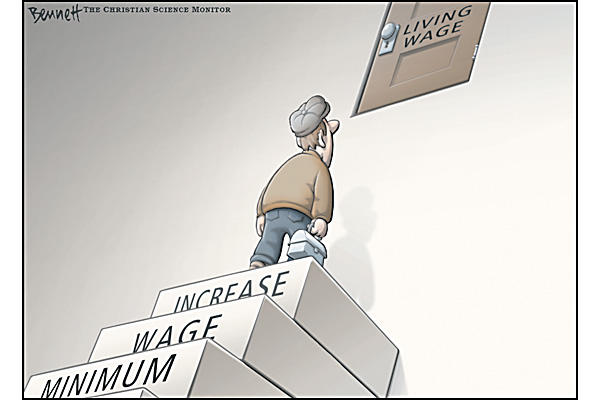Minimum wage jobs are not only for the after-school crowd of kids looking for spending money, but also an entry into the workforce for immigrants, recent graduates and many others who can only find part-time work and need to hold down two or three jobs to survive.
The most recent Statistics Canada job market figures say 70 per cent of Ontario’s 44,000 new jobs created in August are part-time and mostly filled by older workers. It’s also a safe bet they are mostly paid at minimum wage.
Across Canada, minimum wage ranges from $9 an hour in Alberta to $11 in Nunavut, while in most provinces it is set at $10. Unifor’s recent submission to Ontario’s Minimum Wage Panel Review should be required reading for all of them.
Consider that:
– Minimum wages in Ontario have been frozen for three-and-a-half years at $10.25 per hour, while consumer prices have increased by over 7 percent (measured by Statistics Canada’s all-items CPI for Ontario). The resulting decline in real incomes for low-wage workers is very unfair, and has undermined household finances and consumer spending in the province.
– Relative to average wages, and average hourly productivity, minimum wages in Ontario are significantly lower today than they were even in the 1970s.
– Even working full-time year-round, the existing minimum wage would leave a single worker in Ontario (with no dependents) well below low-income cut-off for a single resident (the low-income cut-off is a measure of relative poverty).
Clearly, the existing minimum wage in Ontario doesn’t give working people a chance to provide for themselves and their dependents at a decent standard of living.
The proposal now being considered by the Ontario government to raise the minimum wage to $14 an hour won’t lift the burden of poverty that weighs on low-end wage earners. But it will lighten the load somewhat.
Unifor supports the proposal as a first step of a broader strategy to ensure all workers can enjoy decent living standards.
Our position is that it should be combined, though, with other measures such as employer-specific policies, training and placement initiatives, and other policy tools aimed at lifting wages to what could genuinely be considered a “living wage.” Studies have estimated a living wage to be around $18 per hour for Ontario — an amount sufficient to allow a family of four, with two wage-earners, to pay for the basic necessities of family life.
Some economists argue that higher minimum wages will lead to higher unemployment, but a good body of evidence exists showing little connection between minimum wage levels and employment.
On the other hand, by boosting purchasing power and consumer spending, and helping lower-income families reduce their debt loads, a higher minimum wage could actually have a net positive impact on jobs and on quality of life for everyone.
Unlike the often failed trickle-down theory of wealth accumulation, when minimum wages are raised, there is a demonstrable trickle-up benefit for the entire working community. In addition to the psychological and social benefits of being able to support oneself, stronger family incomes lead to increased demand for products and services, financially viable businesses, and a generally more vibrant community.
Of course the opposite is true when young people can’t afford to move out of their parents’ basement, families rely on food banks to feed their children, or stressed-out, single parents juggle part-time jobs to stay out of poverty.
The Ontario government can and should do better for its lowest paid workers. Giving them a chance at a decent standard of living raises the bar for everyone.
Jerry Dias is the national president of Unifor, Canada’s largest union in the private sector. Created on August 31, with the coming together of the former Canadian Auto Workers union and the Communications, Energy and Paperworkers Union, Unifor represents more than 300,000 members working in at least 20 sectors of the economy (including all stages of the economic value chain, from resources to manufacturing to transportation to private and public services).
This article was first published in the Ottawa Citizen and is reprinted here with permission.



